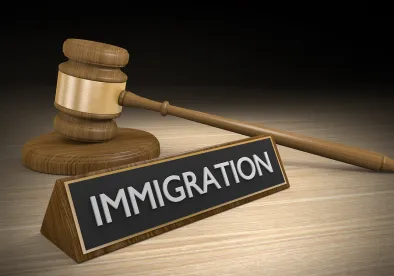Effective Wednesday, June 24 at 12:01 a.m. ET through at least December 31, 2020
A Presidential Proclamation was issued on June 22 to suspend through the end of 2020 the entry into the U.S. of certain temporary nonimmigrant visa beneficiaries. The suspension may be extended. The Proclamation also calls for additional measures to review within 30 days, and every 60 days thereafter, necessary modifications to it and prior proclamations restricting U.S. entry, and to review immigration policies and procedures for the temporary H-1B nonimmigrant visa program and specific employment-based immigrant visa (green card) eligibility categories.
The suspension applies to the following visas and accompanying/following to join dependent visas:
-
H-1B specialty occupation professional and H-4 dependent
-
H-2B temporary non-agricultural worker and H-4 dependent
-
J cultural exchange visitor participating in a program as an Intern, Trainee, Teacher, Camp Counselor, or Au Pair, or who is participating in the Summer Work Travel Program, and J-2 dependent
-
L intra-company transferee multinational executive/manager or specialized knowledge professional, and L-2 dependent
The suspension applies to those who, on the date the Proclamation goes into effect:
-
Are physically located outside of the U.S.
-
Do not already have a valid nonimmigrant visa issued by a U.S. Consulate
-
Do not have an official travel document (such as a transportation letter, boarding foil, or advance parole document) valid on the effective date of the Proclamation or issued on any date thereafter that permits travel to the U.S. to seek entry or admission
This suspension does not apply to those with evidence of qualifying as one of the following:
-
Spouse or child of a U.S. Citizen
-
Lawful Permanent Resident (already in possession of a green card)
-
Anyone seeking to enter the U.S. on a nonimmigrant visa to provide temporary labor or services essential to the U.S. food supply chain
-
Anyone whose entry is in the national interest as will be defined by the Secretaries of State, Labor, and Homeland Security, with a purpose including, but not limited to:
-
Defense, law enforcement, diplomacy, or national security of the U.S.
-
Providing medical care to hospitalized COVID-19 patients
-
Performing medical research at U.S. facilities to help the U.S. combat COVID-19
-
Necessary to facilitate the immediate and continued economic recovery of the U.S.
-
-
Children who, as a result of this suspension, would age-out of eligibility for a visa
-
Individuals seeking asylum, refugee status, withholding of removal, or protection under the Convention Against Torture and Other Cruel, Inhuman or Degrading Treatment or Punishment
Consular officers have discretion to determine whether an individual has established his or her eligibility for an exception of this Proclamation.
Additional Measures
The Proclamation requires that the following measures be considered for future immigration policy:
-
Reduce the risk that certain individuals seeking admission or entry to the U.S. may introduce, transmit, or spread COVID-19 within the U.S.
-
Ensure that individuals possessing or seeking H-1B, EB-2 (second preference members of the professions with advanced degrees/exceptional ability professionals) or EB-3 (third-preference skilled/professional workers) do not disadvantage U.S. workers
-
Prevent individuals from applying for visas, admission to the U.S., or other immigration benefits until that individual has been registered with biographical and biometric information, including photographs, signatures, and fingerprints
-
Prevent certain individuals who have final orders of removal (formerly “deportation”) who are inadmissible or deportable from the U.S.; or who have been arrested for, charged with, or convicted of a criminal offense in the U.S., from obtaining eligibility to work in the U.S.
Other COVID-19 related travel restrictions remain in place, and those who are exempt from the terms of the June 22nd Proclamation may still be subject to other U.S. entry suspensions: individuals are still prohibited from entering the U.S. if they have traveled, within the 14 days prior, to China, Iran, the European Schengen Area, the U.K., Ireland, or Brazil (U.S. Citizens, Lawful Permanent Residents, and immediate family members of both categories are exempt).
Further, the temporary suspension of entry into the U.S. of certain green card applicants outside the U.S. has been extended through the end of the year. See our prior related client alert here.
All travel restrictions and timeframes may change, as additional executive and judicial actions are anticipated. Please also refer to the following online resources:
Associate Ashley Moore contributed to this briefing.





 />i
/>i

